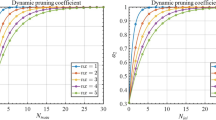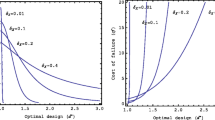Abstract
The rapidly changing requirements of engineering optimization problems require unprecedented levels of compatibility to integrate diverse uncertainty information to search optimum among design region. The sophisticated optimization methods tackling uncertainty involve reliability-based design optimization and robust design optimization. In this paper, a novel alternative approach called risk-based design optimization (RiDO) has been proposed to counterpoise design results and costs under hybrid uncertainties. In this approach, the conditional value at risk (CVaR) is adopted for quantification of the hybrid uncertainties. Then, a CVaR estimation method based on Monte Carlo simulation (MCS) scenario generation approach is derived to measure the risk levels of the objective and constraint functions. The RiDO under hybrid uncertainties is established and leveraged to determine the optimal scheme which satisfies the risk requirement. Three examples with different calculation complexity are provided to verify the developed approach.









Similar content being viewed by others
References
Park GJ, Lee TH, Lee KH, Hwang KH (2006) Robust design: an overview. AIAA J 44(1):181–191
Yao W, Chen XQ, Luo WC, van Tooren M, Guo J (2011) Review of uncertainty-based multidisciplinary design optimization methods for aerospace vehicles. Prog Aerosp Sci 47(6):450–479
Li W, Xiao M, Gao L (2019) Improved collaboration pursuing method for multidisciplinary robust design optimization. Struct Multidiscipl Optim 59(6):1949–1968
Xiao NC, Zuo MJ, Zhou CN (2018) A new adaptive sequential sampling method to construct surrogate models for efficient reliability analysis. Reliab Eng Syst Saf 169:330–338
Eldred MS, Swiler LP, Tang G (2011) Mixed aleatory-epistemic uncertainty quantification with stochastic expansions and optimization-based interval estimation. Reliab Eng Syst Saf 96(9):1092–1113
Jiang C, Qiu HB, Yang Z, Chen LM, Gao L, Li PG (2019) A general failure-pursuing sampling framework for surrogate-based reliability analysis. Reliab Eng Syst Saf 183:47–59
Meng DB, Li YF, Huang HZ, Wang ZL, Liu Y (2015) Reliability-based multidisciplinary design optimization using subset simulation analysis and its application in the hydraulic transmission mechanism design. J Mech Des 137(5):051402
Li W, Xiao M, Yi YS, Gao L (20019) Maximum variation analysis based analytical target cascading for multidisciplinary robust design optimization under interval uncertainty. Adv Eng Inform 40:81–92
Li W, Gao L, Garg A, Xiao M (2020) Multidisciplinary robust design optimization considering parameter and metamodeling uncertainties. Eng Comput. https://doi.org/10.1007/s00366-020-01046-3
Li MY, Wang ZQ (2019) Surrogate model uncertainty quantification for reliability-based design optimization. Reliab Eng Syst Saf 192:106432
Xiao M, Zhang JH, Gao L (2020) A system active learning Kriging method for system reliability-based design optimization with a multiple response model. Reliab Eng Syst Saf 199:106935
Li W, Gao L, Xiao M (2020) Multidisciplinary robust design optimization under parameter and model uncertainties. Eng Optim 52(3):426–445
Wu YT (1994) Computational methods for efficient structural reliability and reliability sensitivity analysis. AIAA J 32(8):1717–1723
Youn BD, Choi KK, Du L (2005) Enriched performance measure approach for reliability-based design optimization. AIAA J 43(4):874–884
Qu X, Haftka RT (2004) Reliability-based design optimization using probabilistic sufficiency factor. Struct Multidiscipl Optim 27(5):314–325
Du XP, Chen W (2004) Sequential optimization and reliability assessment method for efficient probabilistic design. J Mech Des 126(2):225–233
Lim J, Lee B (2016) A semi-single-loop method using approximation of most probable point for reliability-based design optimization. Struct Multidiscipl Optim 53(4):745–757
Gunawan S, Azarm S (2004) Non-gradient based parameter sensitivity estimation for single objective robust design optimization. J Mech Des 126(3):395–402
Gunawan S, Azarm S (2005) A feasibility robust optimization method using sensitivity region concept. J Mech Des 127(5):858–865
Zhou JH, Li M (2014) Advanced robust optimization with interval uncertainty using a single-looped structure and sequential quadratic programming. J Mech Des 136(2):021008
Ohsaki M, Katsura M (2012) A random sampling approach to worst-case design of structures. Struct Multidiscipl Optim 46(1):27–39
Zhou Q, Jiang P, Huang X, Zhang F, Zhou TT (2018) A multi-objective robust optimization approach based on Gaussian process model. Struct Multidiscipl Optim 57(1):213–233
Du XP, Venigella PK, Liu DS (2009) Robust mechanism synthesis with random and interval variables. Mech Mach Theory 44(7):1321–1337
Li FY, Sun GY, Huang XD, Rong JH, Li Q (2015) Multiobjective robust optimization for crashworthiness design of foam filled thin-walled structures with random and interval uncertainties. Eng Struct 88:111–124
Chen ZZ, Qiu HB, Gao L, Su L, Li PG (2013) An adaptive decoupling approach for reliability-based design optimization. Comput Struct 117:58–66
Meng Z, Zhou HL, Li G, Yang DX (2016) A decoupled approach for non-probabilistic reliability-based design optimization. Comput Struct 175:65–73
Jiang C, Long XY, Han X, Tao YR, Liu J (2013) Probability-interval hybrid reliability analysis for cracked structures existing epistemic uncertainty. Eng Fract Mech 112:148–164
Hu NG, Duan BY (2018) An efficient robust optimization method with random and interval uncertainties. Struct Multidiscipl Optim 58(1):229–243
Rockafellar RT, Uryasev S (2000) Optimization of conditional value-at-risk. J Risk 2:21–42
Jabr RA (2005) Robust self-scheduling under price uncertainty using conditional value-at-risk. IEEE Trans Power Syst 20(4):1852–1858
Quagliarella D, Iuliano E (2017) Robust design of a supersonic natural laminar flow wing-body. IEEE Comput Intell Mag 12(4):14–27
Khodabakhsh R, Sirouspour S (2016) Optimal control of energy storage in a microgrid by minimizing conditional value-at-risk. IEEE Trans Sustain Energy 7(3):1264–1273
Li W, Wang T, Xiao M, Lai M, Gao L, Li C (2019) Conditional value at riskbased multidisciplinary robust design optimization. In: IEEE international conference on automation science and engineering. (CASE), pp 30–35
Li W, Xiao M, Garg A, Gao L (2020) A new approach to solve uncertain multidisciplinary design optimization based on conditional value at risk. IEEE Trans Autom Sci Eng. https://doi.org/10.1109/TASE.2020.2999380
Yu XB, Zheng DD (2020) Cross-regional integrated energy system scheduling optimization model considering conditional value at risk. Int J Energy Res 44(7):5564–5581
Sehgal R, Mehra A (2020) Robust portfolio optimization with second order stochastic dominance constraints. Comput Ind Eng 144:106396. https://doi.org/10.1016/j.cie.2020.106396
Lim GJ, Kardar L, Ebrahimi S, Cao WH (2020) A risk-based modeling approach for radiation therapy treatment planning under tumor shrinkage uncertainty. Eur J Oper Res 280(1):266–278
Uryasev S (2000) Conditional value-at-risk: Optimization algorithms and applications. In: IEEE/IAFE/INFORMS conference on computational intelligence for financial engineering (CIFEr) (Cat. No. 00TH8520), pp 49–57
Sandgren E (1990) Nonlinear integer and discrete programming in mechanical design optimization. J Mech Des 112(2):223–229
Acknowledgements
This work was supported by the National Key R&D Program of China [Grant number 2019YFB1706103], the National Natural Science Foundation of China [Grant number 51975075], the Chongqing Technology Innovation and application development special general project [Grant number cstc2020jscx-msxm1193].
Author information
Authors and Affiliations
Corresponding author
Ethics declarations
Conflict of interests
On behalf of all authors, the corresponding author states that there is no conflict of interest.
Additional information
Publisher's Note
Springer Nature remains neutral with regard to jurisdictional claims in published maps and institutional affiliations.
Rights and permissions
About this article
Cite this article
Li, W., Li, C., Gao, L. et al. Risk-based design optimization under hybrid uncertainties. Engineering with Computers 38, 2037–2049 (2022). https://doi.org/10.1007/s00366-020-01196-4
Received:
Accepted:
Published:
Issue Date:
DOI: https://doi.org/10.1007/s00366-020-01196-4




